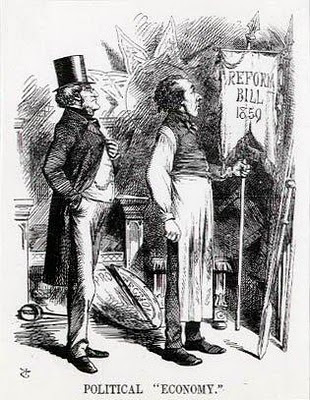The Classics, Engels’ Classics, Part 6
Socialism, Utopian and Scientific
The main downloadable linked text below is “Socialism, Utopian and Scientific”, by Frederick Engels. It is a short text derived from three chapters of Engels’ larger classic work, “Anti-Dühring”, which we can therefore reasonably treat as having been covered in this course on “The Classics”.
This text reflects to some extent upon what a “Classic” is. Dealing with the period subsequent to the Renaissance and prior to the French Revolution that is often referred to as “The Enlightenment”, Engels writes:
“We know today that this kingdom of reason was nothing more than the idealized kingdom of the bourgeoisie; that this eternal Right found its realization in bourgeois justice; that this equality reduced itself to bourgeois equality before the law; that bourgeois property was proclaimed as one of the essential rights of man; and that the government of reason, the Contrat Social [Social Contract] of Rousseau, came into being, and only could come into being, as a democratic bourgeois republic. The great thinkers of the 18th century could, no more than their predecessors, go beyond the limits imposed upon them by their epoch.”
Therefore what were “Classics” in bourgeois philosophy, such as the works of the romantic philosopher Jean-Jacques Rousseau, are not necessarily classics for all time. What is “classic” is something that changes. The classics for the purposes of this ten-part course are the Marxist classics, and “Socialism, Utopian and Scientific” is a typical one.
By Utopian, Engels meant imaginary, or ideal, and therefore typical of the early socialists such as Robert Owen, Henri de Saint-Simon, and François Fourier. Marx and Engels respected these pioneers but also distinguished themselves critically from them. The third part of the Communist Manifesto of 1848 discusses the difference.
Engels begins “Socialism, Utopian and Scientific” with the Great French Revolution that started in 1789. From this point on we meet the class protagonists who allied and clashed from that time on until now, in all possible permutations: Alliances holy and unholy, strategic and tactical; Marriages of convenience and marriages made in heaven.
These classes were the feudal aristocrats; the peasants; the bourgeoisie; and the proletariat.
This work of Engels’ has the additional benefit of introducing the rudiments of political philosophy, and also of leading our thoughts towards the “democratic bourgeois republic”, which is at one and the same time the highest form of political life before socialism - the prerequisite of concerted proletarian action - and on the other hand a form of the State that has to be transcended and left behind.
Engels describes the limitation imposed upon the human Subject by the objective circumstances, and also the possibility of transcending such limitations. This is humanism. Humanism says that humans build humanity within the given material world and history.
There is no great need to search for modern summaries of the classics when the masters themselves have provided very good summaries of their work. Frederick Engels in particular left great summarising, concretising texts, especially towards the end of his friend Karl Marx’s life, and after Marx’s death in 1883. As much as he was apt to deny it, Engels’ works are also thoroughly original.
The current SACP Discussion Document, published in September 2010, called “Expanding Democratic Public Control over the Mining Sector”, makes good use of “Socialism, Utopian and Scientific” to carry a crucial point about nationalisation: That Marxists have never asserted that state ownership, as such, is an inherently progressive or socialist measure. It quotes Engels:
“the official representative of capitalist society – the state – will ultimately have to undertake the direction of production. This necessity for conversion into state property is felt first in the great institutions for intercourse and communication – the post office, the telegraphs, the railways.” (Engels, “Socialism: Utopian and Scientific”, 1880).
Engels was very clear that, in this case, state ownership was NOT about abolishing capitalism.
On the contrary:
“the transformation…into state property, does not do away with the capitalistic nature of the productive forces… The more it [the bourgeois state] proceeds to the taking over of productive forces, the more does it actually become the national capitalist, the more citizens does it exploit. The workers remain wage-workers – proletarians. The capitalist relation is not done away with. It is rather brought to a head.” (Engels, ibid.) 2
After this week the Classics course moves beyond Marx and Engels to include Lenin, Rosa Luxemburg, and Gramsci. You can find a full, hyperlinked list of the main works of Marx and Engels on Marxists Internet Archive (home page reproduced above).
Please download and read this text:
Socialism, Utopian and Scientific, 1880, Engels (16229 words)
Further reading:









